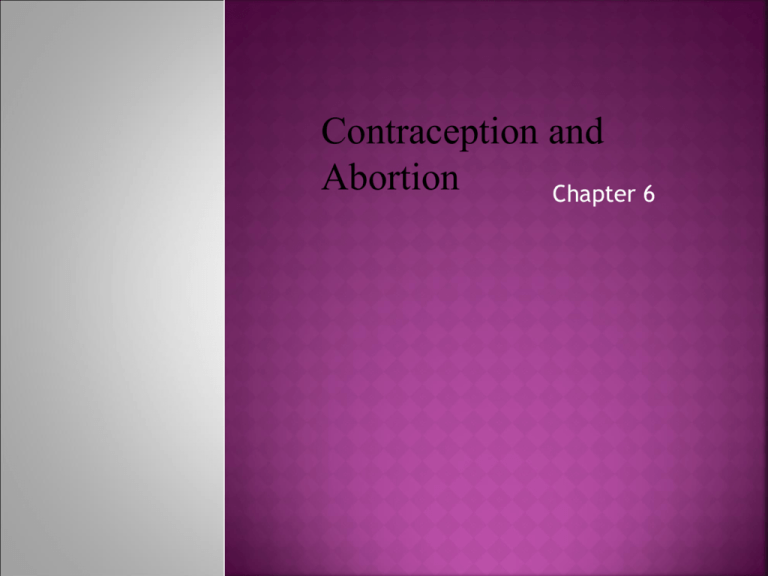
Contraception and
Abortion
Chapter 6
Definition:
Conception: the fusion of an ovum and sperm
that creates a fertilized egg.
Contraception: Preventing conception by
blocking the female’s egg from uniting with the
male’s sperm, thereby preventing pregnancy.
Modern contraception are much more
predictable and effective than in the past.
Many play a role in the prevention against
sexually transmitted diseases
©2010 McGraw-Hill Companies. All Rights Reserved.
2
Based
on the physiology of reproduction
Types: Barrier, Hormonal, Natural Methods,
and Surgical
Factors affecting choice
Advantages and disadvantages
Effectiveness
©2008 McGraw-Hill Companies. All Rights Reserved.
chapter 6
3
Estrogen
and progesterone taken orally
Mimics the hormonal activity of the corpus
luteum
Most common is the combination pill, both
estrogen and progestin
“Minipill” (only progestins)
Advantages
Disadvantages
Effectiveness (~99.7%)
©2008 McGraw-Hill Companies. All Rights Reserved.
chapter 6
4
Thin 1 3/4 inch square patch
Ex: Ortho Evra
Releases estrogen and progestin slowly into the
bloodstream.
Prevention the same way as oral contraceptives
Worn for one week, replaced on the same day for 3
consecutive weeks. Fourth week no patch
Placements: Upper arm, abdomen, buttocks, or upper
torso (not breast)
Advantages
Disadvantages
Effectiveness (~99.7% in the first year of use; less effective
in women weighing more than 198 lbs.)
©2008 McGraw-Hill Companies. All Rights Reserved.
chapter 6
5
The NuvaRing
Resembles the rim of a diaphragm and is molded with
progestin and estrogen
2-inch ring slowly releases the hormones
During fourth week, remove the ring and use a new
ring after the fourth week.
Advantages
Disadvantages
Effectiveness (~99.7%; 8% failure rate)
©2008 McGraw-Hill Companies. All Rights Reserved.
chapter 6
6
Norplant;
(2006)
Jadelle (Norplant II); Implanon
Hormonal method
6 flexible matchstick capsules
Protection for 5 years
Progestin inhibits ovulation
Advantages
Disadvantages
(e.g., menstrual irregularities)
Effectiveness (~99.95%)
©2008 McGraw-Hill Companies. All Rights Reserved.
chapter 6
7
Depo-Provera,
Lunelle
(2002 voluntary recall)
Hormonal treatment
Injectable progestin every 12 weeks
Injectable locations: arm or buttocks
Advantages
Disadvantage
Side effects
period will subside - ovaries will not release egg
It may take 12 months before cycle will return
Effectiveness (~99.5%)
©2008 McGraw-Hill Companies. All Rights Reserved.
chapter 6
8
Postcoital
Pill, Morning After Pill, Plan B
(OTC)
Use a EPT (emergency pregnancy test) kit
Most common is the two dose regimen
Prevents uterine implantation
Needs to be taken within 72 hours. Best used
within 24 hours
©2008 McGraw-Hill Companies. All Rights Reserved.
chapter 6
9
T-380A
(ParaGard) 10 years of protection
Copper
Levonorgestral
(Mirena) 5 years of protection
Release small amounts of progestin
Not
exactly sure how it prevents pregnancy—
perhaps it works to prevent fertilization
Advantages
Disadvantages (e.g., heavy menstrual flow and
bleeding occurs)
Effectiveness (99.2%)
©2008 McGraw-Hill Companies. All Rights Reserved.
chapter 6
10
©2008 McGraw-Hill Companies. All Rights Reserved.
chapter 6
11
Thin
latex sheaths
Protection against STD’s
Advantages
Disadvantages
Effectiveness
Use with spermicide
©2008 McGraw-Hill Companies. All Rights Reserved.
chapter 6
12
Reality
Brand
Polyurethane sheath with two flexible
rings
Advantages
Disadvantage
Effectiveness
©2008 McGraw-Hill Companies. All Rights Reserved.
chapter 6
13
©2008 McGraw-Hill Companies. All Rights Reserved.
chapter 6
14
Dome shaped cup of thin rubber stretched over a
collapsible metal ring.
Available only by prescription
Custom fit
Removed following intercourse
Advantages (e.g., sensation increases, protection against
STI’s)
Disadvantages
Toxic shock syndrome (TSS) – occasionally fatal
bacterial infection
Effectiveness (approximately 84%)
Lea’s Shield (silicon rubber)
©2008 McGraw-Hill Companies. All Rights Reserved.
chapter 6
15
©2008 McGraw-Hill Companies. All Rights Reserved.
chapter 6
16
Small rubber or plastic cap
Must use foam kit
Advantages (similar to the
diaphragm)
Disadvantage
©2008 McGraw-Hill Companies. All Rights Reserved.
chapter 6
17
How
it works
Advantages
Disadvantages
Effectiveness (~71%)
©2008 McGraw-Hill Companies. All Rights Reserved.
chapter 6
18
©2008 McGraw-Hill Companies. All Rights Reserved.
chapter 6
19
Abstinence
Without intercourse or sexual activities
Benefits: more self respect and respect for
others. Security that you are being pursued for
sexual reasons. Less worry about STDs and
Pregnancy.
©2008 McGraw-Hill Companies. All Rights Reserved.
chapter 6
20
FAM
Calendar method
Temperature method
Mucus method
Withdrawal
Combining
methods
©2008 McGraw-Hill Companies. All Rights Reserved.
chapter 6
21
©2008 McGraw-Hill Companies. All Rights Reserved.
chapter 6
22
Severing
of the vasa deferentia
May return to work in 2 days
Reversal varies between 80% to 50%,
depending on the report.
Complication rate (low)
Effectiveness (~99.85%)
©2008 McGraw-Hill Companies. All Rights Reserved.
chapter 6
23
©2008 McGraw-Hill Companies. All Rights Reserved.
chapter 6
24
Tubal
sterilization (laparoscopy) is most
common
Hysterectomy (removal of the uterus)
Complication rate (low)
Reversibility
©2008 McGraw-Hill Companies. All Rights Reserved.
chapter 6
25
©2008 McGraw-Hill Companies. All Rights Reserved.
chapter 6
26
Appropriate
method of birth control
Individual health risks
Implications of unplanned pregnancy
Risks of STDs
Convenience and comfort level
Type of relationship
Ease and Cost
Religious or other philosophical beliefs
©2008 McGraw-Hill Companies. All Rights Reserved.
chapter 6
27
The
history of abortion in the U.S.
Mid-1800’s: Prior to 20 weeks was legal
1900’s: Physicians joined with other groups - stating
untrained people were performing them. All states
made abortion illegal
©2008 McGraw-Hill Companies. All Rights Reserved.
chapter 6
28
1973: Roe versus Wade
Supreme Court ruled :
Pregnancy divided into 3 trimesters
1st trimester - up to women & doctor
2nd trimester - state may regulate
3rd trimester - state may regulate and bar all abortions that are not life
threatening to mother
U.S. Congress and federal Medicaid funds
17 states provide nonfederal public money
Current issues
2000 Nebraska ban on partial birth (Stenberg v. Carhart ); a surgical abortion that is
typically performed during the third trimester or later part of the second trimester
of pregnancy and in which the uterine cervix is dilated and death of the fetus is
induced after it has passed partway through the birth canal -- called also D&X,
partial-birth abortion
President Bush signed the Partial-Birth Abortion Ban Act (S. 3) into law on
November 5, 2003
2004 The Partial Birth Abortion Ban Act is declared unconstitutional by federal
judges in San Francisco, New York, and Lincoln, Nebraska.
2007 Gonzales v. Carhart: The Supreme Court upholds the Partial Birth Abortion Ban
Act.
©2008 McGraw-Hill Companies. All Rights Reserved.
chapter 6
29
Pro-life:
The fertilized egg is a human being from
the moment of conception and therefore an
abortion is murder.
Any women having sex knows pregnancy is possible - she
has a moral obligation
Women unable or unwilling to raise the children should
consider placing him/her up for adoption
Abortion has destructive effects on our traditional morals
and values
©2008 McGraw-Hill Companies. All Rights Reserved.
chapter 6
30
Pro-Choice
:There are distinct stages of fetal
development and that preserving the fetus early in
pregnancy is not the ultimate moral concern.
Women should have the right to make their own decisions
If not legal then unsafe and unregulated practices would
occur
Women would be divided into those who could afford and
those who could not.
Some physicians would be forced to break the law
©2008 McGraw-Hill Companies. All Rights Reserved.
chapter 6
31
Two
categories
Surgical - 98% of all abortions
Medical
Ends
a pregnancy before birth takes place
Miscarriage/Spontaneous abortion - embryo or fetus dies
in the uterus and is expelled by the body
Ending a pregnancy voluntarily - induced abortion
Approx. 88 % of all abortions are performed during the
first trimester
Typically performed at a clinic, health center, or in a
doctors office.
Women are usually able to return home an hour or so later
©2008 McGraw-Hill Companies. All Rights Reserved.
chapter 6
32
Vacuum aspiration
Early abortion; about 6th to 12th week
Used about 90% of all abortions
Vagina is washes with antiseptic, Anesthetic is injected into
or near the cervix.
Cervix is gently and gradually stretched over a 24 hour
period.
After dilation a tube connected to a suction machine gently
empties the uterus
After suction a Curette (narrow metal loop) gently scrapes
the walls of the uterus
After a few hours in recovery the woman can return home
©2008 McGraw-Hill Companies. All Rights Reserved.
chapter 6
33
©2008 McGraw-Hill Companies. All Rights Reserved.
chapter 6
34
MVA
Done within 4 or 5 weeks of last menstrual cycle
More effective and safer if performed at least 6 or 7 weeks
Gentle suction of a syringe
Cervix is dilated with meds.
Uterus is emptied with a handheld syringe
If a definitive gestational sac is not identified then women is
tested for possible ectopic pregnancy
©2008 McGraw-Hill Companies. All Rights Reserved.
chapter 6
35
Possible
physical effects
Fever above 100º F.
Abdominal pain or tenderness
Swelling
Backache
Prolonged or Heavy bleeding
Foul smelling vaginal discharge
Vomiting
Fainting
Delay of 6 or more weeks in resuming menstruation
©2008 McGraw-Hill Companies. All Rights Reserved.
chapter 6
36
Possible
feels after having an abortion
Guilt
New strength in having made and carried out an important
decision
Depression
Sense of loss
Negative feelings about sex
Relationship may end
Anger
Bitterness
©2008 McGraw-Hill Companies. All Rights Reserved.
chapter 6
37
Chapter
6 Connect Assignment Due
Tuesday, February 9th
Study guide for Exam I will be posted on
instructor’s website:
www.cerritos.edu/lnguyen
Exam I next Wednesday, February 10th
No late and/or make-up exams will be
given.
©2010 McGraw-Hill Companies. All Rights Reserved.
Chapter 6
38






